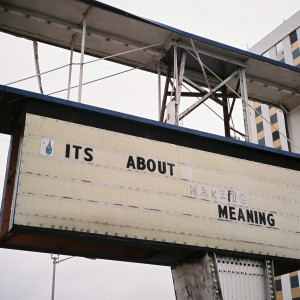Imagine there’s a person running at you with an axe in their hand and a crazed look in their eye. Now imagine you’re sitting at a bar having a quiet conversation with someone and that someone is challenging one of your most deeply-held beliefs. Which of these situations would you say is a serious threat?
You might think being hacked to pieces by an axe-murderer is the only situation worth worrying about, but your brain would beg to differ. Research shows that when our core beliefs are attacked, our brain responds in the same way as it would to a physical threat.
Being defensive of our beliefs makes sense, if you think about it, because when we believe something deeply and fully, we assimilate that belief into our very identity. Labels we put on ourselves are an example of this: democrat, vegan, feminist, atheist, etc. Once we have become the thing we believe in, standing up for it turns into an act of self-defence.
But what happens if we’re wrong? What happens if even some small fact in the fabric of our ideology is proven to be false? Here’s where it gets interesting: when we’re presented with information that clearly disproves our beliefs – factual information that we logically can’t deny – it not only fails to convince us to change our beliefs, but actually makes us cling to them more strongly — at least initially. Psychologists term this the backfire effect.

Photo by Micah. H
This explains why we rally behind a political candidate who gets embroiled in a public scandal, if that candidate is from the party we support; meanwhile a candidate from the opposition who makes the same mistake gets our utter condemnation. It explains why we readily lap up information that supports our beliefs but skip over all those news items and social media posts that don’t (see also: confirmation bias).
You see, our brains are wired to appreciate consistency. Once we’ve built up a particular world view, we feel compelled to protect it. Remember those scenes in Inception where the city starts bending all over the place; things rise up and tumble down and turn inside-out? Think of it like that. Without a solid world view, our reality would shift around us – and our own sanity would be at stake.
This is not to say that all our beliefs are rigid. Some beliefs we hold are quite fluid and can be changed easily. Others are foundational beliefs, the ones that form the pillars of our world view. Remove one of those pillars too quickly and there’s a risk everything else might come crashing down.
So while our world view can change, especially over time, the backfire effect is an immediate and emotionally-charged reaction to the threat of one of those pillar beliefs being attacked. It’s a result of us, or at least our brains, not letting go of those core beliefs without a fight.
So the next question is, if the backfire effect is hardwired into us, why is it important to know about it?
Being aware of the backfire effect is useful on two counts: dealing with the response within yourself, and avoiding evoking it in others. You only need look around you – whether on the internet or in real life – to see that people everywhere are in conflict, often unnecessarily or far too vehemently, over stubborn differences in belief. What if we were all more willing to listen to each other, to admit when we’re wrong, to see things from all different angles?
As Matthew Inman points out in this excellent comic at The Oatmeal, there is no cure for the backfire effect; we can only hope that being aware of it will make us a little less prone to digging our heels in and refusing to budge on a position, even in the face of counter-evidence. Being conscious of it might just make us a little more willing to be flexible for the benefit of both ourselves and others.
Similarly, being respectful of other people’s preciously-held beliefs can make for a less aggressive world. If we’re aware of our human biases, we have a much better chance of sustaining productive, open dialogues rather than putting up defensive walls and being at war over our beliefs.
Feature photo by Azer Koçulu.










Leave a reply